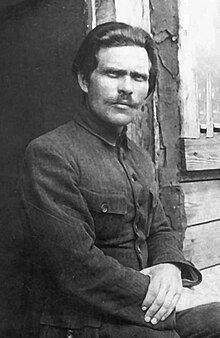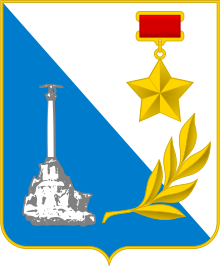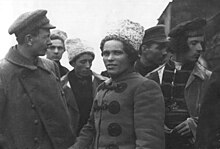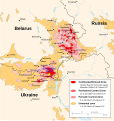Portal:Ukraine
The Ukraine Portal - Портал України
Ukraine Україна (Ukrainian) | |
|---|---|
| ISO 3166 code | UA |
Ukraine is a country in Eastern Europe. It is the second-largest European country after Russia, which borders it to the east and northeast. It also borders Belarus to the north; Poland, Slovakia, and Hungary to the west; and Romania and Moldova to the southwest; with a coastline along the Black Sea and the Sea of Azov to the south and southeast. Kyiv is the nation's capital and largest city, followed by Kharkiv, Dnipro and Odesa. Ukraine's official language is Ukrainian; Russian is also widely spoken, especially in the east and south.
During the Middle Ages, Ukraine was the site of early Slavic expansion and the area later became a key centre of East Slavic culture under the state of Kievan Rus', which emerged in the 9th century. The state eventually disintegrated into rival regional powers and was ultimately destroyed by the Mongol invasions of the 13th century. The area was then contested, divided, and ruled by a variety of external powers for the next 600 years, including the Polish–Lithuanian Commonwealth, the Austrian Empire, the Ottoman Empire, and the Tsardom of Russia. The Cossack Hetmanate emerged in central Ukraine in the 17th century marked on maps as "Ukraine, land of the Cossacks", but was partitioned between Russia and Poland, and ultimately absorbed by the Russian Empire. Ukrainian nationalism developed and, following the Russian Revolution in 1917, the short-lived Ukrainian People's Republic was formed. The Bolsheviks consolidated control over much of the former empire and established the Ukrainian Soviet Socialist Republic, which became a constituent republic of the Soviet Union when it was formed in 1922. In the early 1930s, millions of Ukrainians died in the Holodomor, a human-made famine. The German occupation during World War II in Ukraine was devastating, with 7 million Ukrainian civilians killed, including most Ukrainian Jews.
Ukraine gained independence in 1991 as the Soviet Union dissolved, and declared itself neutral. A new constitution was adopted in 1996. A series of mass demonstrations, known as the Euromaidan, led to the establishment of a new government in 2014 after a revolution. Russia then unilaterally annexed Ukraine's Crimean Peninsula, and pro-Russian unrest culminated in a war in the Donbas between Russian-backed separatists and government forces in eastern Ukraine. Russia launched a full-scale invasion of Ukraine in 2022. Since the outbreak of war with Russia, Ukraine has continued to seek closer ties with the United States, European Union, and NATO.
Ukraine is a unitary state and its system of government is a semi-presidential republic. A developing country, it is the poorest country in Europe by nominal GDP per capita and corruption remains a significant issue. However, due to its extensive fertile land, pre-war Ukraine was one of the largest grain exporters in the world. Nonetheless, Ukraine is a major middle power and possesses the sixth largest and one of the best-funded armed forces in the world. The Ukrainian Armed Forces also operates one of the largest and most diverse drone fleet in the world. It is a founding member of the United Nations, as well as a member of the Council of Europe, the World Trade Organization, and the OSCE. It is in the process of joining the European Union and has applied to join NATO. (Full article...)
In the news
- 1 June 2024 – Russian invasion of Ukraine
- Russian strikes against Ukrainian infrastructure
- Russia launches missile and drone strikes across Ukraine, injuring at least four people and damaging critical infrastructure, including energy facilities. Ukraine says that it shot down 35 of 53 missiles and 46 of 47 drones. (Reuters)
- 31 May 2024 – Russian invasion of Ukraine
- Attacks in Russia during the Russian invasion of Ukraine
- Ukraine launches missile and drone strikes across Krasnodar Krai, Russia, injuring two people and damaging several oil refineries. (Reuters)
- Kharkiv strikes
- At least three people are killed and 16 others are injured when Russian missiles hit civilian infrastructure in Kharkiv. (Reuters)
- Treatment of prisoners of war in the Russian invasion of Ukraine
- Ukraine and Russia announce their first exchange of prisoners of war in nearly four months, with 150 people freed following negotiations mediated by the United Arab Emirates. (Reuters)
- 30 May 2024 – Russian invasion of Ukraine
- Military aid to Ukraine during the Russo-Ukrainian War
- 2024 Kharkiv offensive
Featured pictures
Did you know (auto-generated)

- ... that street artist TVBoy, known for his murals of footballers in Barcelona, painted uplifting art in regions of Kyiv ahead of the one-year anniversary of the 2022 Russian invasion?
- ... that a recent cyberattack on Ukrainian websites was disguised as ransomware?
- ... that in 2014 the European Theatre Convention started a programme known as Dialogue of Cultures to support exchanges with theatres in Ukraine and other Eastern European countries?
- ... that Ukrainians Nadia Smyrnytska, Maria Kalyuzhnaya and Maria Kovalevska joined other prisoners in committing suicide to protest against the abuse of imprisoned women in Kara katorga?
- ... that the Jihadist Burkinabè rebels' ongoing siege of Djibo has been described as a "Ukrainian death"?
- ... that the choral music of Artemy Vedel, who is regarded as one of the Golden Three composers of 18th-century Ukrainian classical music, was censored but performed from handwritten copies?
More did you know -
- ... that the Kryvbas economic region in Ukraine is one of the largest iron ore and steel industry centers in Europe?
- ... that the married Western Ukrainian Clergy became a hereditary caste that dominated western Ukrainian society?
- ... that at its first years Kiev Zoo had to move its animals into the food storage of the main Kiev railway station for the winter?
- ... that the Khreschatyk is the main street of Ukrainian capital Kyiv on which Orange Revolution and other historical events mainly took place?
- ... that Vasyl Avramenko is often referred as "The father of the Ukrainian dance"?
- ... that the neo-classical Verkhovna Rada building in Kyiv features a hundred-tonne glass dome over the chamber where the Verkhovna Rada of Ukraine convenes to enact legislation?
Selected article -

Lviv (/ləˈviːv/, /ləˈviːf/ lə-VEEV, lə-VEEF; Ukrainian: Львів [lʲwiu̯] ; see below for other names) is the largest city in western Ukraine, as well as the sixth-largest city in Ukraine, with a population of 717,500 (2022 estimate).[1] It serves as the administrative centre of Lviv Oblast and Lviv Raion, and is one of the main cultural centres of Ukraine. Lviv also hosts the administration of Lviv urban hromada. It was named after Leo I of Galicia, the eldest son of Daniel, King of Ruthenia.
Lviv emerged as the centre of the historical regions of Red Ruthenia and Galicia in the 14th century, superseding Halych, Chełm, Belz, and Przemyśl. It was the capital of the Kingdom of Galicia–Volhynia from 1272 to 1349, when it was conquered by King Casimir III the Great of Poland. From 1434, it was the regional capital of the Ruthenian Voivodeship in the Kingdom of Poland. In 1772, after the First Partition of Poland, the city became the capital of the Habsburg Kingdom of Galicia and Lodomeria. In 1918, for a short time, it was the capital of the West Ukrainian People's Republic. Between the wars, the city was the centre of the Lwów Voivodeship in the Second Polish Republic. After the German-Soviet invasion of Poland in 1939, Lviv was annexed by the Soviet Union. (Full article...)In the news
- 1 June 2024 – Russian invasion of Ukraine
- Russian strikes against Ukrainian infrastructure
- Russia launches missile and drone strikes across Ukraine, injuring at least four people and damaging critical infrastructure, including energy facilities. Ukraine says that it shot down 35 of 53 missiles and 46 of 47 drones. (Reuters)
- 31 May 2024 – Russian invasion of Ukraine
- Attacks in Russia during the Russian invasion of Ukraine
- Ukraine launches missile and drone strikes across Krasnodar Krai, Russia, injuring two people and damaging several oil refineries. (Reuters)
- Kharkiv strikes
- At least three people are killed and 16 others are injured when Russian missiles hit civilian infrastructure in Kharkiv. (Reuters)
- Treatment of prisoners of war in the Russian invasion of Ukraine
- Ukraine and Russia announce their first exchange of prisoners of war in nearly four months, with 150 people freed following negotiations mediated by the United Arab Emirates. (Reuters)
- 30 May 2024 – Russian invasion of Ukraine
- Military aid to Ukraine during the Russo-Ukrainian War
- 2024 Kharkiv offensive
Selected anniversaries for June

- June 4, 1920 — Treaty of Trianon was signed between the Allied and Associated Powers and Hungary signed at the Grand Trianon Palace at Versailles, France.
- June 28, 1996 - is a public holiday honoring the adoption of the Constitution in Ukraine by the Verkhovna Rada
Photo gallery
Related portals
Religions in Ukraine
Post Soviet states
Other countries
WikiProjects and collaborations
Associated Wikimedia
The following Wikimedia Foundation sister projects provide more on this subject:
-
Commons
Free media repository -
Wikibooks
Free textbooks and manuals -
Wikidata
Free knowledge base -
Wikinews
Free-content news -
Wikiquote
Collection of quotations -
Wikisource
Free-content library -
Wikiversity
Free learning tools -
Wikivoyage
Free travel guide -
Wiktionary
Dictionary and thesaurus
New articles
Ukrainian editions of Wikimedia projects
Cite error: There are <ref group=lower-alpha> tags or {{efn}} templates on this page, but the references will not show without a {{reflist|group=lower-alpha}} template or {{notelist}} template (see the help page).
- ^ Чисельність наявного населення України на 1 січня 2022 [Number of Present Population of Ukraine, as of January 1, 2022] (PDF) (in Ukrainian and English). Kyiv: State Statistics Service of Ukraine. Archived (PDF) from the original on 4 July 2022.



![Image 1 Makhno in 1921 Nestor Ivanovych Makhno (Ukrainian: Нестор Івaнович Махно, pronounced [ˈnɛstor iˈʋɑnowɪt͡ʃ mɐxˈnɔ]; 7 November 1888 – 25 July 1934), also known as Batko Makhno (батько Махно, lit. 'Father Makhno'), was a Ukrainian anarchist revolutionary and the commander of the Revolutionary Insurgent Army of Ukraine during the Ukrainian War of Independence. He established the Makhnovshchina (loosely translated as "Makhno movement"), a mass movement by the Ukrainian peasantry to establish anarchist communism in the country between 1918 and 1921. Initially centered around Makhno's home province of Katerynoslav and hometown of Huliaipole, it came to exert a strong influence over large areas of southern Ukraine, specifically in what is now the Zaporizhzhia Oblast of Ukraine. Raised by a peasant family and coming of age amid the fervor around the 1905 Revolution, Makhno participated in a local anarchist group and spent seven years imprisoned for his involvement. With his release during the 1917 Revolution, Makhno became a local revolutionary leader in his hometown and oversaw the expropriation and redistribution of large estates to the peasantry. In the Ukrainian Civil War, Makhno sided with the Soviet Russian Bolsheviks against the Ukrainian nationalists and White movement, but his alliances with the Bolsheviks did not last. He rallied Bolshevik support to lead an insurgency, defeating the Central Powers's occupation forces at the Battle of Dibrivka and establishing the Makhnovshchina. Makhno's troops briefly integrated with the Bolshevik Red Army in the 1919 Soviet invasion of Ukraine, but split over differences on the movement's autonomy. Makhno rebuilt his army from the remains of Nykyfor Hryhoriv's forces in western Ukraine, routed the White Army at the Battle of Perehonivka, and captured most of southern and eastern Ukraine, where they again attempted to establish anarchist communism. (Full article...)](http://upload.wikimedia.org/wikipedia/en/d/d2/Blank.png)




























































